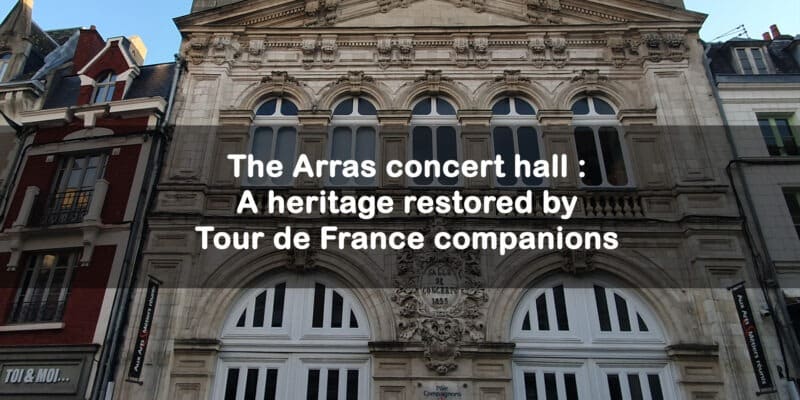In the early 19th century, Arras opened up to cultural modernity. The town, like many others in France, took advantage of the spread of public concerts to create meeting places and social spaces. It was against this backdrop that the Salle des Concerts was built in 1827. Designed by the city’s architect, Joseph Traxler, it was conceived from the outset as a showcase for music. Its large central dome, interior volume and proportions provide the exceptional acoustics for which the venue is renowned.
The white stone façade, restored in 1853, adds to the elegance of the building, which backs onto the theatre stage. theater stage. With the emergence of this concert hall, Arras acquired a dynamic cultural center, encouraging artistic expression and the sharing of ideas. Regularly hosting concerts and shows, the hall quickly became one of the city’s most popular social venues. It also bears witness to the cultural movement of the time, inspired by the “Italian-style” buildings in vogue since the Age of Enlightenment, as highlighted in the book “Arras. Histoire et renaissance d’un théâtre” by Max Gaillard. Over the decades, however, the concert hall has stood the test of time and wear. As the years went by, the building needed major renovation. That’s where the Compagnons du Tour de France come in, bringing their craftsmanship to a major project.
Les “Compagnons du Tour de France” : Guarantors of know-how and heritage
The restoration of the concert hall and surrounding buildings, notably the Salle de l’Harmonie, is part of a tradition of heritage preservation. The renovation, costing almost 60 million francs, calls on the expertise of the Compagnons du Tour de France d’Arras. These craftsmen, heirs to a centuries-old tradition of passing on knowledge and excellence in the building trades, embarked on a veritable “open-heart surgery”, to quote photographer Éric Legrand, who documented the work from 2004 to 2007. The journeymen restored the building, respecting the original architecture while integrating modern techniques. They moved into the Salle de l’Harmonie, now the Pôle “Compagnons et Maîtres d’Œuvre”, which houses a permanent exhibition on compagnonnage. This initiative illustrates the Compagnons’ determination to preserve not only the structures, but also the spirit of the place. By renovating these spaces, they are perpetuating ancestral know-how, while placing it at the service of contemporary society.
The Compagnons’ presence in Arras goes beyond simply restoring the building. They offer demonstrations of their skills and training courses for young people aged 9 to 18. These activities introduce new generations to building trades such as timber construction, masonry, roofing and painting/decoration. The Pôle “Compagnons et Maîtres d’Œuvre” has thus established itself as a high-level training center, where both traditional techniques and new technologies related to the building trade are taught.
A renaissance for culture and craftsmanship
Renovation of the Arras concert hall is part of an overall initiative to revitalize the city’s cultural heritage.
The work, which was documented and analyzed by a team of academics as documented in Max Gaillard’s book, preserved the soul of the building. What’s more, the Compagnons were able to give it a new vocation: that of a center dedicated to the transmission of knowledge and craft trades. Today, the concert hall is also home to the Pôle “Compagnons et Maîtres d’Œuvre”, which organizes tours, exhibitions and conferences on the history and techniques of the Compagnons. This presence allows visitors to discover the world of the Compagnons du Tour de France, the itinerant craftsmen who, for centuries, have contributed to the construction of emblematic buildings in France.
The “Musée du Compagnonnage d’Arras” (museum), housed in the Salle de l’Harmonie, enhances this experience by offering a journey through the history of the trades, masterpieces and symbols of the movement. The project to renovate the concert hall and adjacent theater was much more than a simple restoration. It was a veritable renaissance, highlighting the cultural commitment of the city of Arras and the richness of its artistic life. According to academic research compiled by Max Gaillard, the concert hall, though modest in its capacity, has always been a space with unique acoustics, hosting a variety of performances and contributing to the city’s cultural renown. The work carried out by the Compagnons du Tour de France also enabled the venue to be adapted to the requirements of contemporary performing arts, while respecting its historic character. Today, the carefully restored concert hall is a multi-purpose space capable of hosting cultural and artistic events of all kinds. Through their work, the journeymen demonstrate once again that architectural heritage and craftsmanship are intimately linked. They ensure the transmission of know-how and contribute to the concert hall’s place in Arras’ future.
Location of the concert hall and the Maison des Compagnons du Tour de France : 32 bis Rue Ernestale, 62000 Arras !
The concert hall : A lively venue in the heart of the city
The concert hall in Arras is not just a relic of the past, it’s a living space, anchored in the present and looking to the future. The Compagnons du Tour de France, by renovating it and setting up the Pôle “Compagnons et Maîtres d’Œuvre”, have turned it into a center of learning and exchange. This approach is part of a drive to preserve and enhance local heritage, while offering young people and visitors the chance to learn about the crafts.
Today, the Arras concert hall continues to boast exceptional acoustics, a legacy of its in the 19th century. It also hosts workshops, courses and demonstrations highlighting the importance of companionship and craftsmanship in preserving and creating heritage. Visitors can immerse themselves in this world by exploring exhibitions on the history of the journeymen, their techniques and their masterpieces. The concert hall has thus become a symbol of Arras’ cultural and artisanal vitality. A whole part of the city’s history and that of the Compagnons is revealed here, reminding us of the importance of preserving and passing on this age-old know-how.
R.C.
